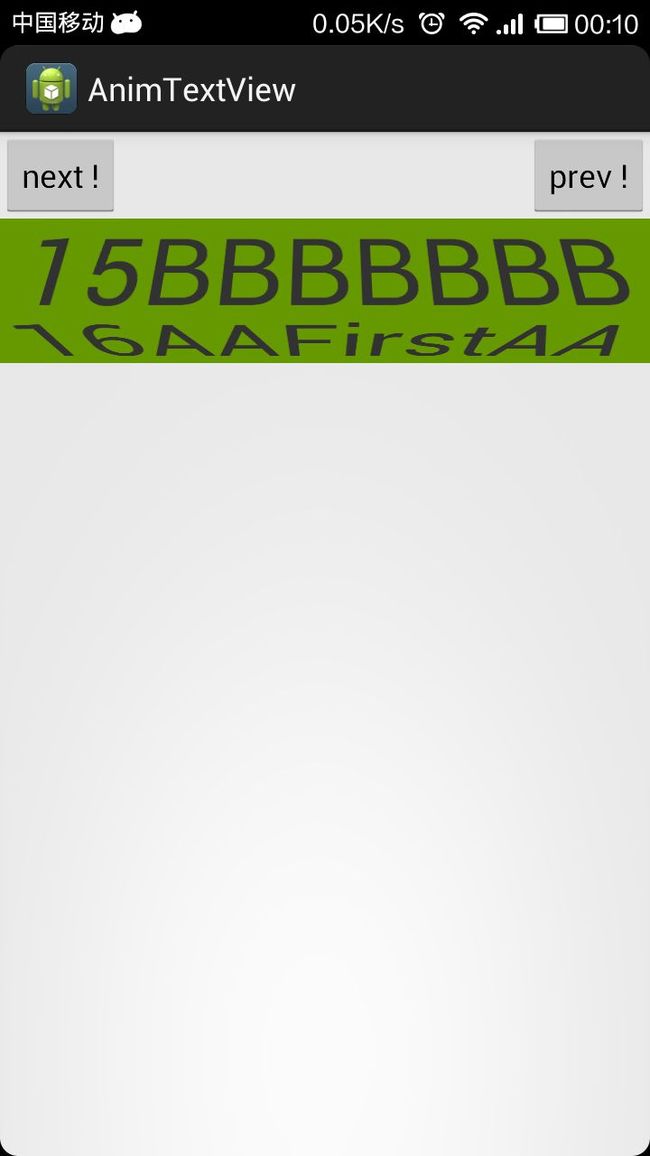动画实现实现上下滚动的TextView
发一下牢骚和主题无关:
先看一下效果图吧:
一 说明
这里重要应用类 AutoTextView,这是一个自定义的类,继承至TextSwitcher,下面临 AutoTextView类做简要说明:
1. 该类应用的重点,在于设置两个动画, setInAnimation(...) 和 setOutAnimation(...),分离是文字进入的动画和文字退出的动画;
2. 类中定义了一个外部类-Rotate3dAnimation,重要靠该类实现文字进出动画,该外部类继承至Animation。说来偶合,这个恰好是在apiDemo中看到了,自定义Animation我还是第一次应用,动画逻辑均在void applyTransformation(float interpolatedTime, Transformation t)中实现,代码相当锋利,我在原来的基础上,更改了一下,实现了上述的效果,
二 代码部分:
1.AutoTextView.java
package com.example.animtextview;
import android.content.Context;
import android.content.res.TypedArray;
import android.graphics.Camera;
import android.graphics.Matrix;
import android.util.AttributeSet;
import android.view.Gravity;
import android.view.View;
import android.view.animation.AccelerateInterpolator;
import android.view.animation.Animation;
import android.view.animation.Transformation;
import android.widget.TextSwitcher;
import android.widget.TextView;
import android.widget.ViewSwitcher;
public class AutoTextView extends TextSwitcher implements
ViewSwitcher.ViewFactory {
private float mHeight;
private Context mContext;
//mInUp,mOutUp分离构成向下翻页的进出动画
private Rotate3dAnimation mInUp;
private Rotate3dAnimation mOutUp;
//mInDown,mOutDown分离构成向下翻页的进出动画
private Rotate3dAnimation mInDown;
private Rotate3dAnimation mOutDown;
public AutoTextView(Context context) {
this(context, null);
// TODO Auto-generated constructor stub
}
public AutoTextView(Context context, AttributeSet attrs) {
super(context, attrs);
// TODO Auto-generated constructor stub
TypedArray a = context.obtainStyledAttributes(attrs, R.styleable.auto3d);
mHeight = a.getDimension(R.styleable.auto3d_textSize, 36);
a.recycle();
mContext = context;
init();
}
private void init() {
// TODO Auto-generated method stub
setFactory(this);
mInUp = createAnim(-90, 0 , true, true);
mOutUp = createAnim(0, 90, false, true);
mInDown = createAnim(90, 0 , true , false);
mOutDown = createAnim(0, -90, false, false);
//TextSwitcher重要用于文件切换,比如 从文字A 切换到 文字 B,
//setInAnimation()后,A将执行inAnimation,
//setOutAnimation()后,B将执行OutAnimation
setInAnimation(mInUp);
setOutAnimation(mOutUp);
}
private Rotate3dAnimation createAnim(float start, float end, boolean turnIn, boolean turnUp){
final Rotate3dAnimation rotation = new Rotate3dAnimation(start, end, turnIn, turnUp);
rotation.setDuration(800);
rotation.setFillAfter(false);
rotation.setInterpolator(new AccelerateInterpolator());
return rotation;
}
//这里返回的TextView,就是我们看到的View
@Override
public View makeView() {
// TODO Auto-generated method stub
TextView t = new TextView(mContext);
t.setGravity(Gravity.CENTER);
t.setTextSize(mHeight);
t.setMaxLines(2);
return t;
}
//定义动作,向下滚动翻页
public void previous(){
if(getInAnimation() != mInDown){
setInAnimation(mInDown);
}
if(getOutAnimation() != mOutDown){
setOutAnimation(mOutDown);
}
}
//定义动作,向上滚动翻页
public void next(){
if(getInAnimation() != mInUp){
setInAnimation(mInUp);
}
if(getOutAnimation() != mOutUp){
setOutAnimation(mOutUp);
}
}
class Rotate3dAnimation extends Animation {
private final float mFromDegrees;
private final float mToDegrees;
private float mCenterX;
private float mCenterY;
private final boolean mTurnIn;
private final boolean mTurnUp;
private Camera mCamera;
public Rotate3dAnimation(float fromDegrees, float toDegrees, boolean turnIn, boolean turnUp) {
mFromDegrees = fromDegrees;
mToDegrees = toDegrees;
mTurnIn = turnIn;
mTurnUp = turnUp;
}
@Override
public void initialize(int width, int height, int parentWidth, int parentHeight) {
super.initialize(width, height, parentWidth, parentHeight);
mCamera = new Camera();
mCenterY = getHeight() / 2;
mCenterX = getWidth() / 2;
}
@Override
protected void applyTransformation(float interpolatedTime, Transformation t) {
final float fromDegrees = mFromDegrees;
float degrees = fromDegrees + ((mToDegrees - fromDegrees) * interpolatedTime);
final float centerX = mCenterX ;
final float centerY = mCenterY ;
final Camera camera = mCamera;
final int derection = mTurnUp ? 1: -1;
final Matrix matrix = t.getMatrix();
camera.save();
if (mTurnIn) {
camera.translate(0.0f, derection *mCenterY * (interpolatedTime - 1.0f), 0.0f);
} else {
camera.translate(0.0f, derection *mCenterY * (interpolatedTime), 0.0f);
}
camera.rotateX(degrees);
camera.getMatrix(matrix);
camera.restore();
matrix.preTranslate(-centerX, -centerY);
matrix.postTranslate(centerX, centerY);
}
}
}
2. MainActivity.java
package com.example.animtextview;
import android.os.Bundle;
import android.app.Activity;
import android.view.View;
import android.view.View.OnClickListener;
import android.widget.Button;
public class MainActivity extends Activity implements OnClickListener {
private Button mBtnNext;
private Button mBtnPrev;
private AutoTextView mTextView02;
private static int sCount = 10;
@Override
protected void onCreate(Bundle savedInstanceState) {
super.onCreate(savedInstanceState);
setContentView(R.layout.activity_main);
init();
}
private void init() {
// TODO Auto-generated method stub
mBtnNext = (Button) findViewById(R.id.next);
mBtnPrev = (Button) findViewById(R.id.prev);
mTextView02 = (AutoTextView) findViewById(R.id.switcher02);
mTextView02.setText("Hello world!");
mBtnPrev.setOnClickListener(this);
mBtnNext.setOnClickListener(this);
}
@Override
public void onClick(View arg0) {
// TODO Auto-generated method stub
switch (arg0.getId()) {
case R.id.next:
mTextView02.next();
sCount++;
break;
case R.id.prev:
mTextView02.previous();
sCount--;
break;
}
mTextView02.setText(sCount%2==0 ?
sCount+"AAFirstAA" :
sCount+"BBBBBBB");
System.out.println("getH: ["+mTextView02.getHeight()+"]");
}
}
3. activity_main.xml
<LinearLayout xmlns:android="http://schemas.android.com/apk/res/android"
xmlns:auto3d="http://schemas.android.com/apk/res/com.example.animtextview"
android:layout_width="match_parent"
android:layout_height="match_parent"
android:orientation="vertical" >
<RelativeLayout
android:layout_width="match_parent"
android:layout_height="wrap_content" >
<Button
android:id="@+id/next"
android:layout_width="wrap_content"
android:layout_height="wrap_content"
android:layout_alignParentLeft="true"
android:layout_alignParentTop="true"
android:text="@string/next" />
<Button
android:id="@+id/prev"
android:layout_width="wrap_content"
android:layout_height="wrap_content"
android:layout_alignParentRight="true"
android:layout_alignParentTop="true"
android:text="@string/prev" />
</RelativeLayout>
<com.example.animtextview.AutoTextView
android:id="@+id/switcher02"
android:layout_width="match_parent"
android:layout_height="wrap_content"
android:background="@android:color/holo_green_dark"
auto3d:textSize="30sp" />
</LinearLayout>
代码中没写太多注释,不过结构还算清晰,应该不难看懂!
三 小结
我认为该控件实现的难点在于 动画文件的编写,即Rotate3dAnimation中applyTransformation(...)方法的实现,通过控制camara在Y方向上挪动和在X方向上的旋转,从而造成上下翻滚的视觉感,然后将该值转换到matrix上,从而改变了参数(..,Transformation t).有兴致的朋友可以直接改写该方法,便可失掉不同动画效果的TextSwitcher.
原文地址: http://blog.csdn.net/zjc08125/article/details/8953140
转载请注明出处
四 源代码
源码地址:http://pan.baidu.com/share/link?shareid=477859&uk=956460186
文章结束给大家分享下程序员的一些笑话语录: 古鸽是一种搜索隐禽,在中国快绝迹了…初步的研究表明,古鸽的离去,很可能导致另一种长着熊爪,酷似古鸽,却又习性不同的猛禽类——犤毒鸟
